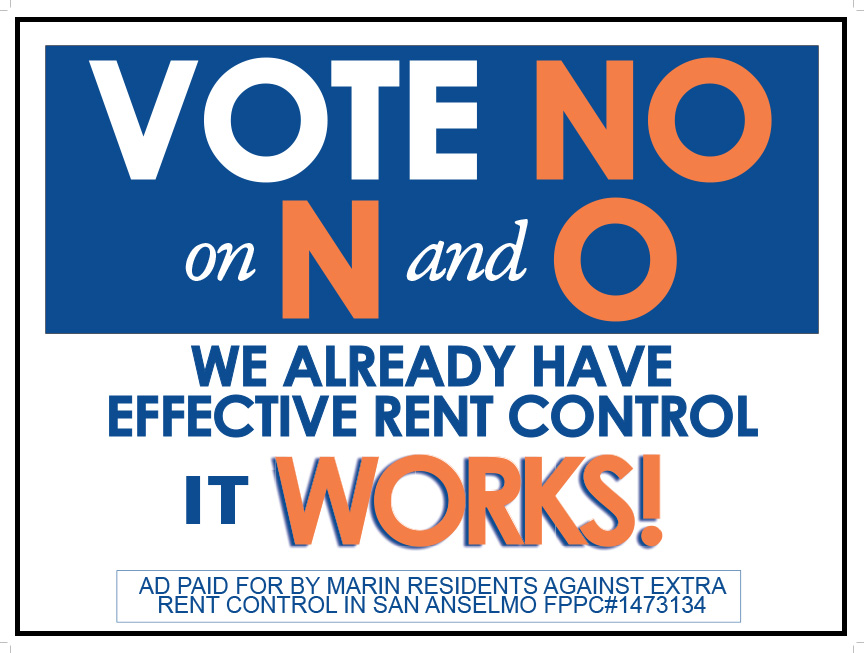
Rent Control Soundly Rejected in Marin!
Please see MarinResidents.org main page for a recent article!.
Measure N – “Rent Stabilization”, and Measure 0 – “Just Cause” are the proposed excessive rent control measures that will affect many residential rental units in San Anselmo.
These are extra, local regulations that go beyond the state rent control laws enacted in 2019 (AB 1482) that will:
- have negative financial consequences for homeowners, housing providers, and renters
- make initial rents more expensive for renters
- limit income potential and retirement savings for ‘mom & pop’ landlords
- negatively affect the value of all houses in the rent-controlled area
California rent control already does a pretty good job of protecting tenants and providing a reasonable return for housing providers. We don’t need excessive rent control that will hurt the rental market by driving out housing providers and driving up rents!
For a deeper dive into the recent history of rent control in San Anselmo, view the San Anselmo Rent Control History page.
Extra rent control is bad for smaller communities. Please check out our resources page for additional information.
We can keep working on housing affordability with your help. Please consider donating:
We asked what our former mayors thought about the proposed, new extreme rent control. Here’s what they said:
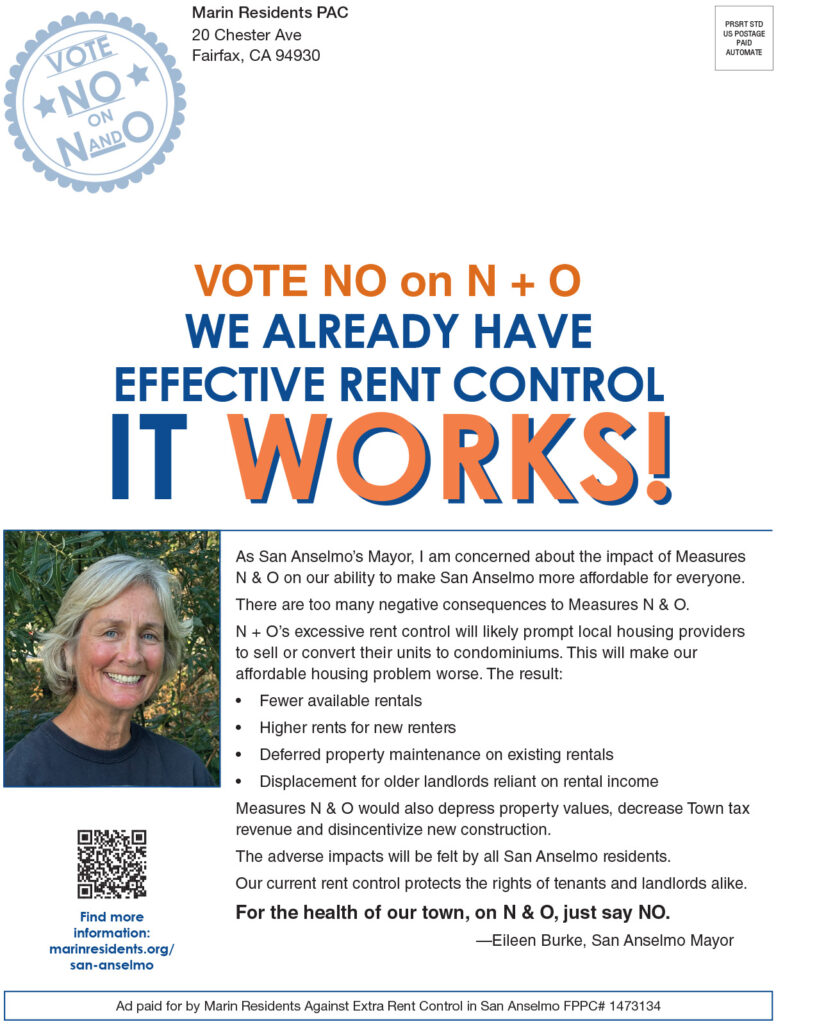
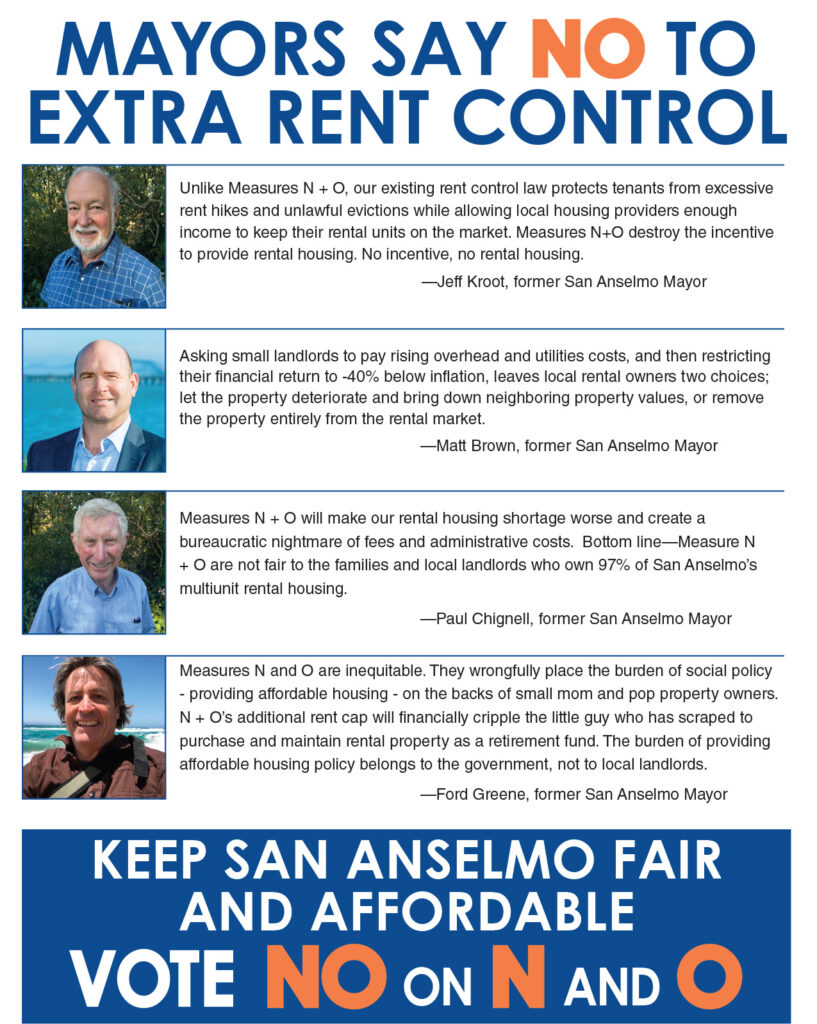
We need your help letting your neighbors know the negative consequences of extreme rent control.
If you are a San Anselmo resident, we can use your help putting out yard signs in your neighborhood. If you can help, email SAVol@marinresidents.org. We’ll provide everything you need to help spread the word about the excessive rent control the DSA wants in your neighborhood. And we can always use your financial support and volunteer time. Go to our PAC page at MarinResidentsPAC.org to contribute!
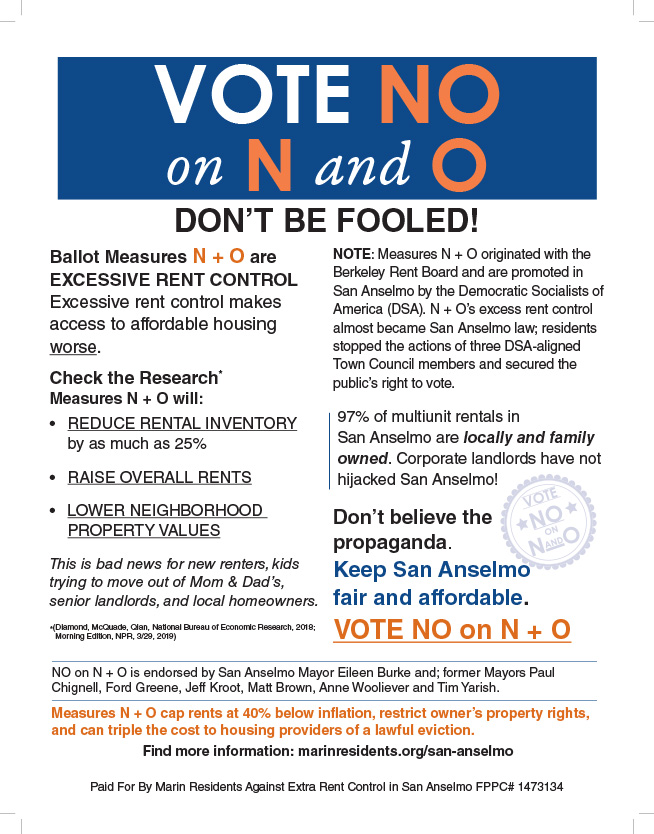
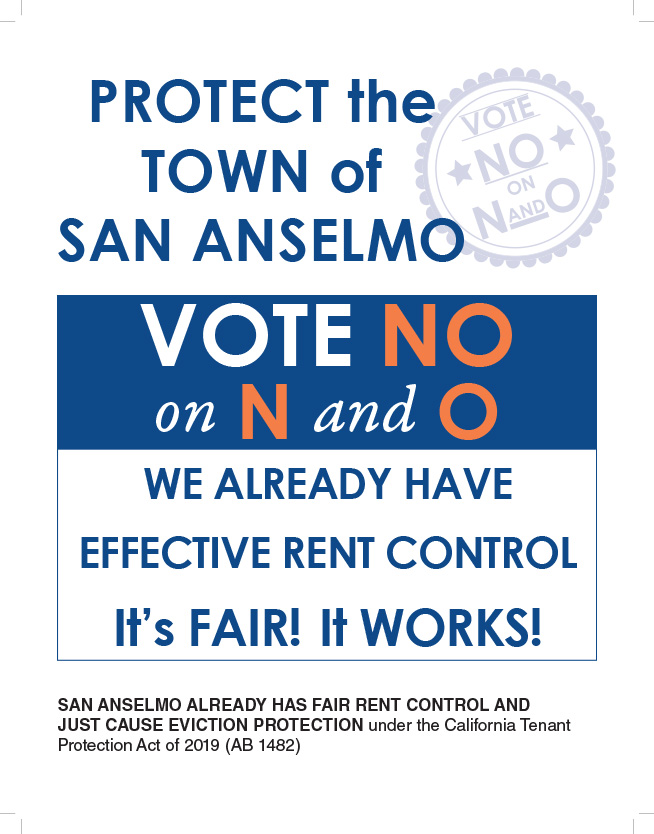
Marin IJ Editorial
Marin IJ had a recent editorial Suggesting that San Anselmo Voters Vote NO on N+O. You can find the IJ editorial here: Editorial: San Anselmo renter-supportive measures N, O go too far.
Or read the text:
Marin IJ, Oct 13, 2024: San Anselmo renter-supportive measures N, O go too far.
Measures N and O on the Nov. 5 ballot have San Anselmo voters embroiled in a political battle over local rent control and additional protections for renters.
Larkspur and Fairfax have similar campaigns underway on their ballots.
The impetus is similar. The town council hears from many renters – local residents and voters – that rent increases are pricing them out of town. Council members seek to help out by adopting a local rent control law, stronger than the state’s 2019 version, and laws that would protect tenants from evictions caused by no fault on their part.
The dilemma is borne out in the measures N and O campaign, which puts the town laws to a town-wide vote. The referendums’ authors say the town-adopted laws go too far and will hurt local landlords, not the few “corporate landlords” that backers of rent control have typically cast as their targets in their push for tougher laws.
The town’s rent control law, approved on a 3-2 council vote, sets a limit on annual increases at 5% or 60% of the consumer price index, whichever is lower. State law set an annual cap of 10%, which backers of Measure N say doesn’t offer enough protection for tenants.
For example, Larkspur’s voter-approved rent control law sets a 7% cap, although its voters are being asked to lower that cap to 3%.
San Anselmo Mayor Eileen Burke, who voted against the town law, says the tighter local limits on rents could force landlords to lose money. The measures are unfair to landlords who aren’t charging sky-high rents, but rely on the income.
Burke warns passing measures N and O may worsen local housing problems, leading property owners to sell, lowering property values and deterring developers interested in building apartments.
Limits on increases won’t necessarily keep pace with the higher costs for utility bills, insurance rates and local taxes landlords face. Landlords can petition the town to get approval to charge higher rents, but the process is costly and takes time.
“The housing affordability crisis is a community problem. Forcing housing providers to lose money year after year via extreme rent control is a bad answer,” Burke and other critics state in their ballot argument.
Burke says she supports “reasonable” rent control, but says having a small town like San Anselmo adopt its own rules – and incurring the cost of enforcement – is not the right solution.
“This measure goes way too far for our town,” Burke says, noting that critics of the measures had little trouble getting almost 1,500 voters’ signatures to put the measures on the ballot.
Measure O increases protections for renters, but its opponents say it meddles in landlord’s management of their properties, including increasing the cost of evicting “problem tenants.”
Councilmember Alexis Fineman dismisses Burke’s and others’ criticism as “speculative,” stressing that single family homes, duplexes and ADUs are exempt.
She may be one of the most well-versed advocates for rent control that we have heard from during this cycle of local rent control measures.
She and other council supporters are trying to help out those who approached the council seeking some relief from local rents that she says on average rose 91% between 2010 and 2019.
Keeping rents affordable is critical to promoting economic and racial diversity, Fineman says. Rent control is “another tool in the toolbox” the town needs to meet its goal of providing affordable housing, she says.
The problem with measures N and O is that it appears council members’ political priorities have gotten too far ahead of building strong public consensus.
There’s no debate that rents are high and rising faster than what’s affordable to a growing segment of the town’s population.
In a small town where Democrats outnumber Republicans better than 9 to 1, liberal politics prevail. But for a significant number of residents, including many local leaders, who are opposing measures N and O, the Town Council has gone too far, imposing tough local laws to solve a regional problem.
The IJ editorial board recommends no votes on measures N and O.